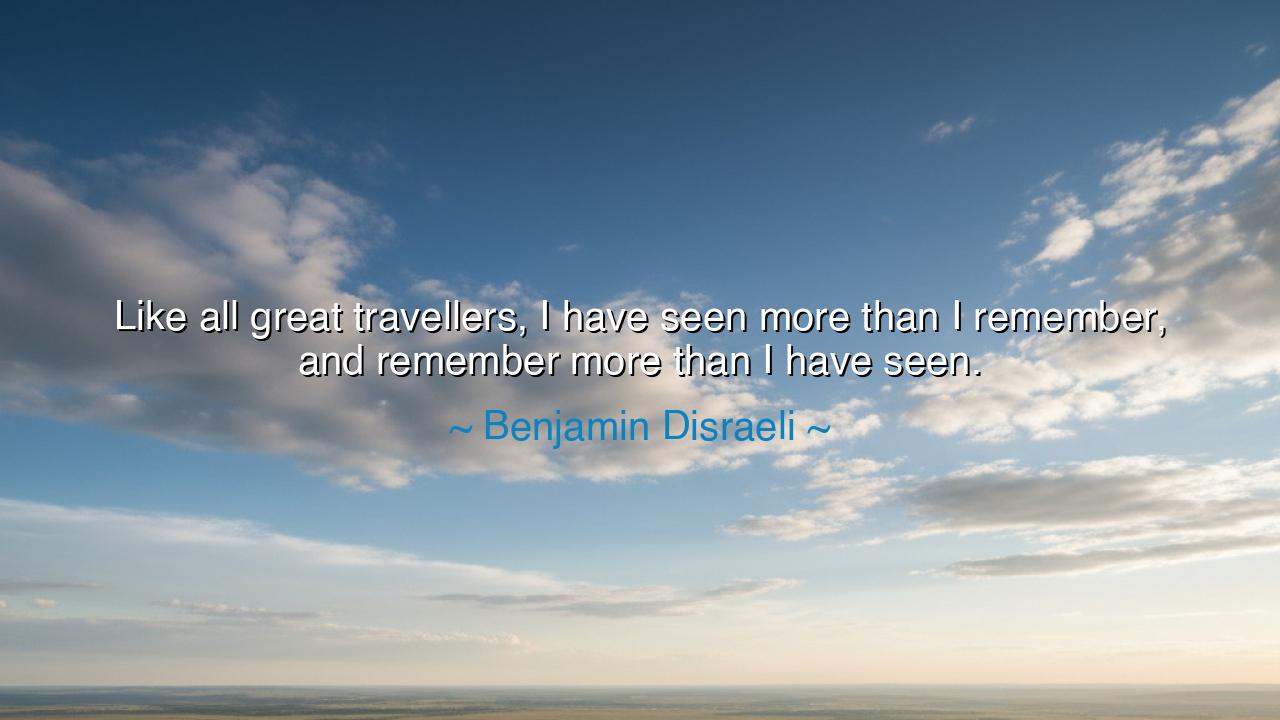
Like all great travellers, I have seen more than I remember, and
Like all great travellers, I have seen more than I remember, and remember more than I have seen.






The words “Like all great travellers, I have seen more than I remember, and remember more than I have seen” were spoken by Benjamin Disraeli, a man of intellect, imagination, and statecraft — a poet’s soul clothed in the garb of a politician. Yet in this reflection, he did not speak as a ruler, but as a wanderer, one who had tasted the strange, shifting wisdom of the road. His words hold within them the paradox of memory and experience, of sight and understanding, of the way the world enters not just the eyes, but the soul. For to travel, in truth, is to move not merely through places, but through oneself — and to emerge changed, bearing a mixture of what was witnessed and what was felt.
To say “I have seen more than I remember” is to confess the vastness of the world and the limits of the human heart. No traveler, however keen-eyed, can hold every mountain, every face, every sound of the cities they pass. The senses overflow, and much is forgotten — swallowed by the immensity of life’s tapestry. The world is too full of wonders for any one soul to contain. Yet to say “I remember more than I have seen” is to speak of the alchemy of memory — how the mind transforms what it gathers, deepening it, beautifying it, sometimes even inventing truth from emotion. Memory is not a mirror; it is a canvas, and time is the brush that paints upon it.
In the ancient days, the philosophers and wanderers knew this mystery well. Herodotus, the father of history, travelled far through the lands of Egypt, Persia, and Greece. He recorded what he saw, and yet his writings are as much shaped by wonder as by fact. He saw more than he could remember, but in his remembering, he gave birth to stories greater than the sum of his travels. Likewise, Marco Polo, when he returned from the East, told tales that many thought impossible — not because they were false, but because they were colored by the magic of what memory makes of awe. The traveler’s gift is not only to see the world, but to feel it so deeply that it grows within him, until his recollections become myths that live longer than the journeys themselves.
Disraeli’s words also speak to the power of imagination — that sacred fire which joins the real and the remembered. Every traveler carries home two maps: one drawn by the hands of geography, and the other drawn by the heart. The first fades with time, but the second endures, filled with colors no eye ever truly saw. In every journey, the mind takes what is partial and makes it whole, weaving lessons from fragments, beauty from confusion, meaning from mere observation. Thus, in remembering, the traveler creates anew — becoming a storyteller, a keeper of the unseen truth hidden within the seen world.
There is a story told of Ibn Battuta, the Moroccan traveler who journeyed farther than any man of his time. He wandered through Africa, Asia, and the Middle East, covering more than seventy-five thousand miles — yet in his later years, when he recounted his adventures, he could not recall every path or every face. Still, when he spoke of the lands and peoples he had encountered, his heart gave them life again. What he could not remember with his mind, he remembered with his spirit. This is the essence of Disraeli’s saying — that the true traveler carries the journey within, reshaped by the soul’s remembrance rather than the eyes’ precision.
But the quote also holds a gentle warning. It reminds us that our memories, like dreams, are never perfect. What we recall of life — our journeys, our triumphs, our pains — are never the events themselves, but our interpretations of them. We must learn to cherish them, but also to understand their nature. For memory is both truth and illusion, both guide and ghost. To know this is to walk wisely — not clinging too tightly to what we think we remember, but allowing the heart to hold what truly matters: the feeling, the transformation, the awakening that every great experience leaves behind.
The lesson, then, is this: live so richly that even what you forget nourishes you, and remember so deeply that even what you never saw can teach you. The greatest travelers are not those who visit many lands, but those who find meaning in each one — who allow their memories to grow, not as records of distance, but as gardens of reflection. Whether you wander across oceans or only through the small paths of your daily life, let your seeing and your remembering both become acts of creation.
So, my child, when you journey through this world, do not seek only to see, but to feel. Let the sights pass through your eyes, but let them take root in your heart. For when your travels are done, it will not be the number of places you have seen that define you — but the richness of what you remember, and the beauty of what you have become through the remembering.






AAdministratorAdministrator
Welcome, honored guests. Please leave a comment, we will respond soon